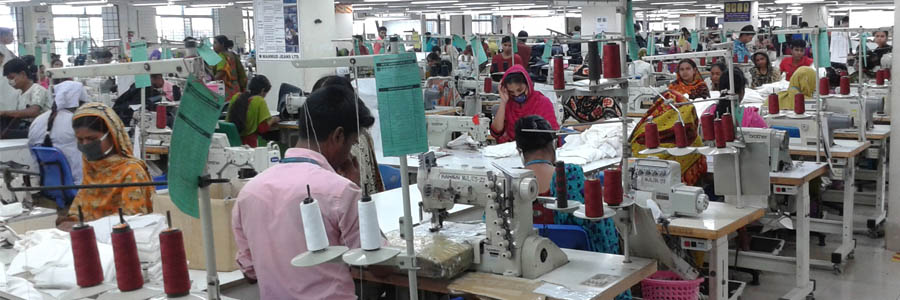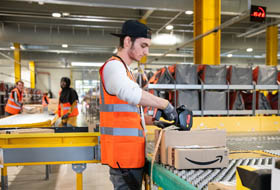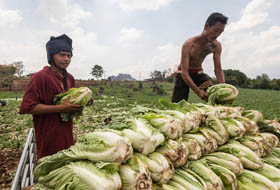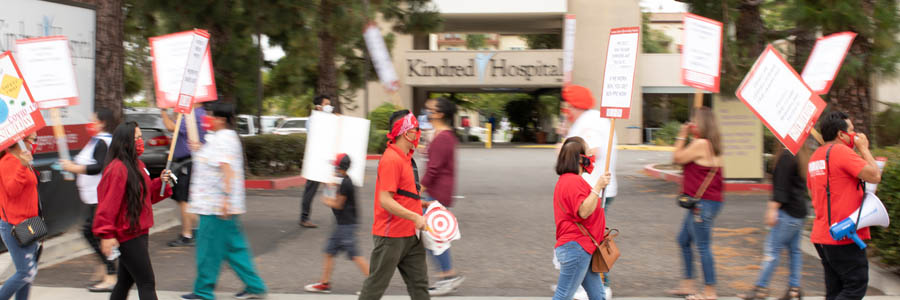Low wage and low priority
Jennifer Venis, IBA Multimedia JournalistWednesday 12 August 2020

Pic: A child farmer harvests chillis. Thailand, 2018. Shutterstock.com/Somchai_Stock
Throughout the Covid-19 pandemic, workers on the lowest wages have had the least protection – from the virus, from unemployment and from financial distress – despite their work being deemed ‘essential.’ Global Insight explores how governments and corporations can step up to create a better world for these workers.
On returning to work at the tail-end of the country’s virus peak in March, Chinese workers – from medical staff to construction teams – protested the lack of economic support offered as compensation for the total shutdown.
As parts of the Western world reopened, and workers were asked to return to hotels, restaurants and offices, many followed the lead of their Chinese counterparts. In France, nationwide demonstrations called for better pay and resources for healthcare workers. In Los Angeles, United States workers protested reopening hotels amid a spike of Covid-19 cases among hospitality workers.
‘The better society takes care of its workers, the better its economic recovery will be,’ believes Elise Groulx Diggs, Co-Chair of the IBA Business Human Rights Committee and a Washington, DC-based associate tenant at Doughty Street Chambers. Highlighting the way Covid-19 is bringing health and safety to the forefront of the world stage, she says ‘we’re talking about the right to life and human dignity.’
But health and safety is just one of myriad concerns facing workers. In April, the second edition of the International Labour Organization’s (ILO) COVID-19 and the world of work bulletin argues that protecting economies and workers requires ‘large-scale, integrated, policy measures.’
To fight the pandemic, the ILO has structured recommended changes around four pillars, based on their International Labour Standards, including: stimulating the economy and employment; supporting enterprises, jobs and incomes; protecting workers in the workplace; and relying on social dialogue for solutions.
These solutions, which also address new safety concerns generated by Covid-19, also need to tackle the long-standing inequalities the pandemic has highlighted and exacerbated.
Invest in supply chains
The United Nations’ Policy Brief: The Impact of COVID-19 on Women, published in April, highlights that ‘Women will be the hardest hit by this pandemic but they will also be the backbone of recovery in communities. Every policy response that recognises this will be more impactful for it.’
Katherine Meighan is General Counsel of the International Fund for Agricultural Development (IFAD), a UN agency focused on eradicating poverty in the rural areas of developing countries. She says, ‘women are major contributors to rural economies. In studies they often can be said to produce up to 50 per cent of the world’s food, but globally they own less than 15 per cent of the land. So there’s a need to change traditional gender roles to be more inclusive.’
The better society takes care of its workers, the better its economic recovery will be
Elise Groulx Diggs
Co-Chair, IBA Business Human Rights Committee
Meighan argues that since women tend to be resilient, creative and tenacious, especially in times of crisis, improving their status can lead to greater productivity, as well as a fairer distribution of labour.
For example, ‘some women on IFAD’s projects have transitioned quickly to new kinds of business lines, such as making masks, and are using technology to be able to distribute food with an app when they are not able to physically get to local markets,’ she says.
Meighan highlights the importance of a holistic approach, working directly with communities, to establish a policy approach with the governments of member countries, and enabling investment from the private sector.
‘When larger companies see the creativity and business needs that can be produced and supported by the early stages of the supply chain, such as smaller agricultural entrepreneurs, they will also see the financial interest in having broader equality within the legal framework, as well as within the social norms in particular countries,’ believes Meighan.
Failing to support low-wage workers in the early supply chain can directly exacerbate poverty. Meighan notes that many small-scale farmers, hit by market closures and transport disruption during lockdowns, have resorted to selling input, like seeds, in order to have enough money to feed their families. ‘This starts a downward spiral because then when planting season comes, they don’t have the required inputs to continue their livelihood,’ she explains.
Most of the people that IFAD works with have household incomes of $2 or less per day. Any small decrease in income will have an enormous effect, throwing people into a ‘poverty trap’ from which they are unable to escape.
Meighan says, ‘private sector companies further up the supply chain, buying agricultural products, can be involved in getting crucial inputs to rural agricultural entrepreneurs in time for harvest.’ She points to IFAD’s current partnerships with private sector companies, in which buyers offer regular advisory services to farmers regarding more efficient methods of production – and with higher quality comes higher prices.
Slow, sustainable fashion
For years, worker rights advocates in the fashion industry have been calling for corporations to invest in their supply chains. They suggest companies should pay a premium – often only two per cent of the purchasing price – to ensure better wages for garment factory workers and to contribute towards the provision of social protection, such as unemployment insurance for workers.
The Traidcraft Exchange is a United Kingdom charity working to promote fairness in trade on behalf of people in the world’s poorest countries. Its April 2020 report Bailing out the Supply Chain argues ‘contributions to a social protection system should equally be considered an integral part of the salary. Such contributions vary by country, with Cambodia and Pakistan having established some systems. Countries like Bangladesh have not done so, resulting in lower prices for brands.’
But focusing on cheap sourcing decreases resilience in the supply chain, leaving the industry vulnerable to crises like Covid-19.
Els de Wind, Co-Chair of the IBA Global Employment Institute and Head of the International Employment team at Van Doorne, points out that ‘Western companies should be making sure they can still use supply chains when things go back to normal.’

Workers in a textile factory in Bangladesh, May 2015. Shutterstock. com/Pinar Alver
Instead, when Covid-19 hit, some fashion companies, foreseeing a slump in profits, pushed the risks down the supply chain to manufacturers. Several cancelled orders through contractual loopholes and force majeure claims have been deemed legally questionable by some advocates. Further, many unilaterally amended payment and business terms without supplier consent and with little scope for suppliers to push back.
As a result, Bangladesh, the second-largest clothing producer after China, is set to lose about $6bn this fiscal year. Millions of workers who were already on poverty wages have lost their jobs, gone unpaid for months, or worked for reduced pay.
Women produce up to 50 per cent of the world’s food, but globally they own less than 15 per cent of the land. So there’s a need to change traditional gender roles to be more inclusive
Katherine Meighan
General Counsel of the International Fund for Agricultural Development
Published in April, the Center for Global Workers’ Rights’ report Abandoned? The Impact of Covid-19 on Workers and Businesses at the Bottom of Global Garment Supply Chains highlights that this crisis ‘illustrates the extreme fragility of a system based on decades of buyers squeezing down on prices paid to suppliers.’ The result for Bangladesh, the Center says, is ‘factory closures, unpaid workers with no savings to survive the hard times ahead, and a government with such a low tax revenue that it has a very limited ability to provide meaningful support to workers and the industry.’
Ben Vanpeperstraete is Garment Policy Adviser at the Traidcraft Exchange. He says ‘existing agreements between buyers and suppliers are very asymmetric, with lots of liability for suppliers, and one-sided unilateral cancellation clauses and payment terms in favour of the buyers. And despite these agreements being enormously favourable towards the buyers, brands can still just get away with ignoring or amending these already favourable provisions.’
Fiona Gooch, Senior Private Sector Policy Adviser at the Traidcraft Exchange, says this power imbalance makes ‘private law completely inappropriate in this space.’
And yet, private law is the only way to hold companies legally accountable for breaching contracts with suppliers. Christie Miedema is Campaign and Outreach Coordinator at the Clean Clothes Campaign, which works towards garment and sportswear industry worker empowerment. She asks ‘what factory owner would dare sue buyers if they would then lose contracts?’
Even if suppliers could use the law to protect their businesses and workers, individual cases will not establish long-lasting change. As Groulx Diggs says, ‘the solution has to be collective and come from sectors, not individual companies. Individual decisions can’t help with systemic problems and that’s where reform is needed.’
Miedema argues that ‘due diligence should be set down in law so that countries can hold these companies accountable.’
But Scott Nova, Executive Director of the Worker Rights Consortium, says the fashion trade is so important to supplier countries that governments are incentivised ‘to allow employers to violate rights of workers because that’s the only way they can meet the price demands of brands and retailers.’
He adds, ‘responsibility lies with the governments that have jurisdiction over those companies to regulate them. Why is it legal for a US company to produce goods in a factory with no fire exits, a factory that would not be operating legally in the US and isn’t legal in Bangladesh?’
In April, the European Commissioner for Justice, Didier Reynders, announced the European Commission will introduce ‘mandatory corporate environmental and human rights due diligence’ across all sectors, hopefully as soon as 2021. Groulx Diggs says enforceability will be key.
Vanpeperstraete points out that established guidance, like the UN’s Guiding Principles on Business and Human Rights, reflects a clear policy decision to limit corporate responsibility to do no harm, and it remains the state responsibility to fulfil rights. The Traidcraft Exchange is calling for legislation on outlawing unfair trading practices that are at the core of the industry.
Nova points to Section 307 of the US Tariff Act as a model for the kind of robust legislation needed to provide protections against all kinds of labour rights violations. The law prohibits the importation of any item where production has involved forced labour. It has civil penalties, which apply to the importing corporation, and can also lead to criminal prosecution of corporations and their executives under other US statutes. But enforcement, he says, is weak.
‘If the countries that are major importers of consumer goods – or international bodies covering those countries – had that type of statute applied across the broad range of labour rights issues and enforced it against the importing company and its executives, that would be revolutionary in terms of incentivising companies to improve the protections for their supply chain workers,’ Nova argues.
For now, he says, those violations are a profit centre because they make production cheaper, and there are no real legal consequences for companies.
In late July, a coalition of 180 civil rights organisations issued a call to action from the fashion industry, claiming ‘virtually the entire global apparels industry is tainted by forced Uighur and Turkic Muslim labour.’ The claims relate to reports that China has forced an estimated 1.8 million Uighurs and other minority ethnic groups into forced labour camps and factories in the Xinjiang, where they allegedly produce cotton and garments for leading apparel brands, a claim Chinese authorities deny.
The coalition calls for fashion companies to cut ties with the region, and in April a group of human rights lawyers argued that sale of products sourced from the region breached several UK laws.
In the UK in June, both a media investigation and the campaign group Labour Behind the Label reported instances of workers in Leicester’s garment factories being paid as little as £2–3.50 per hour, while national minimum wage for most adults is £8.72.
The report also highlights that wages as low as £1 had previously been exposed in 2015, but no effective action was taken by authorities. Although some brands ceased sourcing from the city, others stayed. Labour Behind the Label claims engagement with at least one brand regarding living wages for workers and improving transparency in their supply chains, but these problems continue.
The report also highlights serious concerns about worker health protections during the Covid-19 pandemic, claiming that ‘workers have been told to come into work – even when they showed symptoms of Covid-19 – otherwise they would lose their job.’
As shops reopen, there is a danger that pushing for profits to facilitate economic recovery for companies will see more workers’ health and safety needs fall by the wayside. For many suppliers, cost concerns will limit the ability of employers to provide sufficient health protections for workers.

Workers sort packages in the Amazon factory in Vélizy-Villacoublay, France, September 2019. Shutterstock. com/Frederic Legrand - COMEO
Nova says, ‘finding a safe way to produce is crucial’ in every industry, but ‘broadly speaking, buyer companies are not taking the necessary steps to ensure that workers will be safe in their supplier factories – if anything, they’re pushing for lower prices and, in some cases, pressing suppliers to produce more quickly as stores reopen.’
And countless workers, including those classed as essential, have limited access to social protections. Many have had to choose between avoiding work to protect their health or working so they can afford to eat. As a result, they have continued working in the face of serious health risks, without protective equipment and even if they or their colleagues have fallen ill.
Social protection
In April, the United States Department of Labor (DOL) guidance hollowed out new federal requirements for sick leave for private sector workers, which had been introduced by the Families First Coronavirus Response Act (FFCRA). The DOL guidance meant that 75 per cent of US workers remained unprotected because their employers were exempt. Those affected by such exemptions included all healthcare staff, including hourly workers who may have had no other leave to lean on if they became ill. Further guidance was issued in May and June.
Gig economy workers around the world are generally classed as independent contractors, which means they are not entitled to paid sick leave, holiday pay, a minimum wage or even state unemployment support and statutory sick pay.
Also in April, the European Union Agency for Fundamental Rights published a bulletin: Coronavirus pandemic in the EU – Fundamental Rights Implications. It emphasises that ‘workers in precarious employment situations are often ineligible for the benefit and compensation schemes governments offer,’ including those schemes brought in to combat the impact of the pandemic and employment restrictions.
De Wind is afraid that, particularly in the US, ‘people who suspect they are ill will try to conceal any symptoms and go to work because they can’t afford to lose pay, and they can’t get treatment because they can’t afford medical bills.’
The ILO’s Sickness benefits during sick leave and quarantine brief, published in May, warns that sickness benefit coverage gaps force people to work when they may be ill. Closing those gaps, it says, benefits public health, poverty prevention, and the promotion of human rights to health and social security.
Time to reinvent remittances
Migrant workers, who are generally exempt from social protections in host countries, have been heavily impacted by employment losses. This impact also extends to the recipients of money (remittances) that these workers normally send back to their home countries. According to the UN, one in nine people globally are the recipients of remittances.
An April 2020 World Bank study suggested that global remittances may decline by 20 per cent – the sharpest decline in recent history – as a result of the economic fallout from Covid-19.
Although employment losses may be somewhat unavoidable, there is scope to innovate to protect the value of remittances. Katherine Meighan identifies problems with how remittances are traditionally sent – high transfer fees mean when a worker sends $200 home, generally only $185 is received.
Meighan believes there is space for private sector investment to design strategies for sending and receiving remittances with reduced fees. But she also points to the possibility of digitising remittances, which requires expanding access to digital technology in rural communities of developing countries, so remittances can be directly accessed by all.
‘Digital remittances represent a huge opportunity for rural households to be mainstreamed in using digital finance,’ she explains. ‘In this way, remittances can create a valuable bridge for rural households to access digital financial services, such as savings, insurance and credit more easily, particularly women.’
‘This digital expansion to foster rural financial inclusion is something that the private sector can be on the leading edge of,’ adds Meighan.

Migrant workers from Myanmar in Thailand, April 2020. Shutterstock.com/Somrerk Witthayanant
In the UK, where healthcare wages have remained stagnant for years, a critical lack of personal protective equipment (PPE) has endangered staff lives. Many care workers – almost 60 per cent of whom are reportedly on hourly contracts, making them exempt from income protections – have had to buy their own PPE.
Groulx Diggs argues that ‘this is a central issue on how to go forward after Covid-19 – how can you have an economy going and strong if your workers are all ill or without the protection of a good social net, and therefore exposed and at risk?’
Among the ILO’s aforementioned four key pillars, the second pillar ‘Supporting enterprises, jobs and incomes’ encourages governments to ‘extend social protection for all.’ In May, the ILO argued that recovery can only be sustained and future crises prevented if countries ‘can transform their ad hoc crisis response measures into comprehensive social protection systems.’
Enforcing legislation
Until more protective measures are brought in permanently, workers left exposed by their governments or employers will need the support of the legal profession and judiciary to enforce their rights.
In France, Amazon was forced to confront the safety concerns in its warehouses when unionised workers raised alarm about conditions, including a lack of hygiene products and the inability to perform social distancing.
A court in Nanterre determined that Amazon’s safety provisions were lacking. The Court banned the sale of non-essential items until the company properly evaluated and addressed risks to staff, giving Amazon 24 hours to comply and a threat of EUR 1m fine for every day it failed to meet these obligations.
Amazon has repeatedly denied allegations that it hasn’t kept staff safe and appealed the ruling. ‘We are perplexed by the ruling made in spite of overwhelming evidence about the safety measures we’ve implemented to protect our employees,’ the company stated.
Western companies should be making sure they can still use supply chains when things go back to normal
Els de Wind
Co-Chair of the IBA Global Employment Institute
Although the Appeal Court softened the blow to Amazon by reducing the fine for noncompliance, it otherwise upheld the Nanterre Court ruling, stressing that Amazon had not created a company-wide system to evaluate worker protections. As a result, Amazon suspended activities in French warehouses until it could ensure compliance. Warehouses began to reopen in May.
In the US, taxi drivers in the gig economy have taken to the courts to assert their right to sick pay. Uber drivers in California won three days of paid sick leave for drivers who have Covid-19 symptoms but no official diagnosis, after reaching a resolution in the lawsuit.
California enacted Assembly Bill 5 in January, giving gig economy workers a legal right to be recognised as employees, with all the rights and protections this categorisation confers. At a hearing about ride-sharing platform Lyft’s drivers’ entitlement to sick pay in early April, US District Judge Vince Chhabria declared that companies refusing to meet such legal obligations were ‘disregarding the rule of law.’

Long-term care hospital workers protest patient and staff safety in Westminster, California, US. July 2020. REUTERS/Mike Blake
In a statement, Lyft said it believes its drivers are properly classified as independent contractors, adding ‘this is a complex issue that affects hundreds of thousands of people.’
Alex Marshall is Chair of the Couriers and Logistics Branch of the Independent Workers’ Union of Great Britain (IWGB). The IWGB has pursued legal action for gig workers in the UK. He believes ‘the protection of low-paid workers is so far down a company’s priorities that the threat of legal action is the best way to get positive solutions.’
Holistic approach
Groulx Diggs says ‘Covid-19 exposed issues that do not fit into conventional frameworks of national employment, labour and public health law. None of these problems exist in isolation. This needs to be addressed at every level, including the advancement of mandatory due diligence frameworks and bilateral investment treaties.’
No one solution will solve the complex and interconnected array of systems that perpetuate inequality, violations of worker rights and the conditions that allow the burden of the impact of crises like Covid-19 to fall on those least able to shoulder it. Cross-sector, cross-governmental partnerships are essential to create lasting change.
As Miedema highlights, ‘we can’t go back to how it was.’
Jennifer Venis is Multimedia Journalist at the IBA and can be contacted at jennifer.venis@int-bar.org
